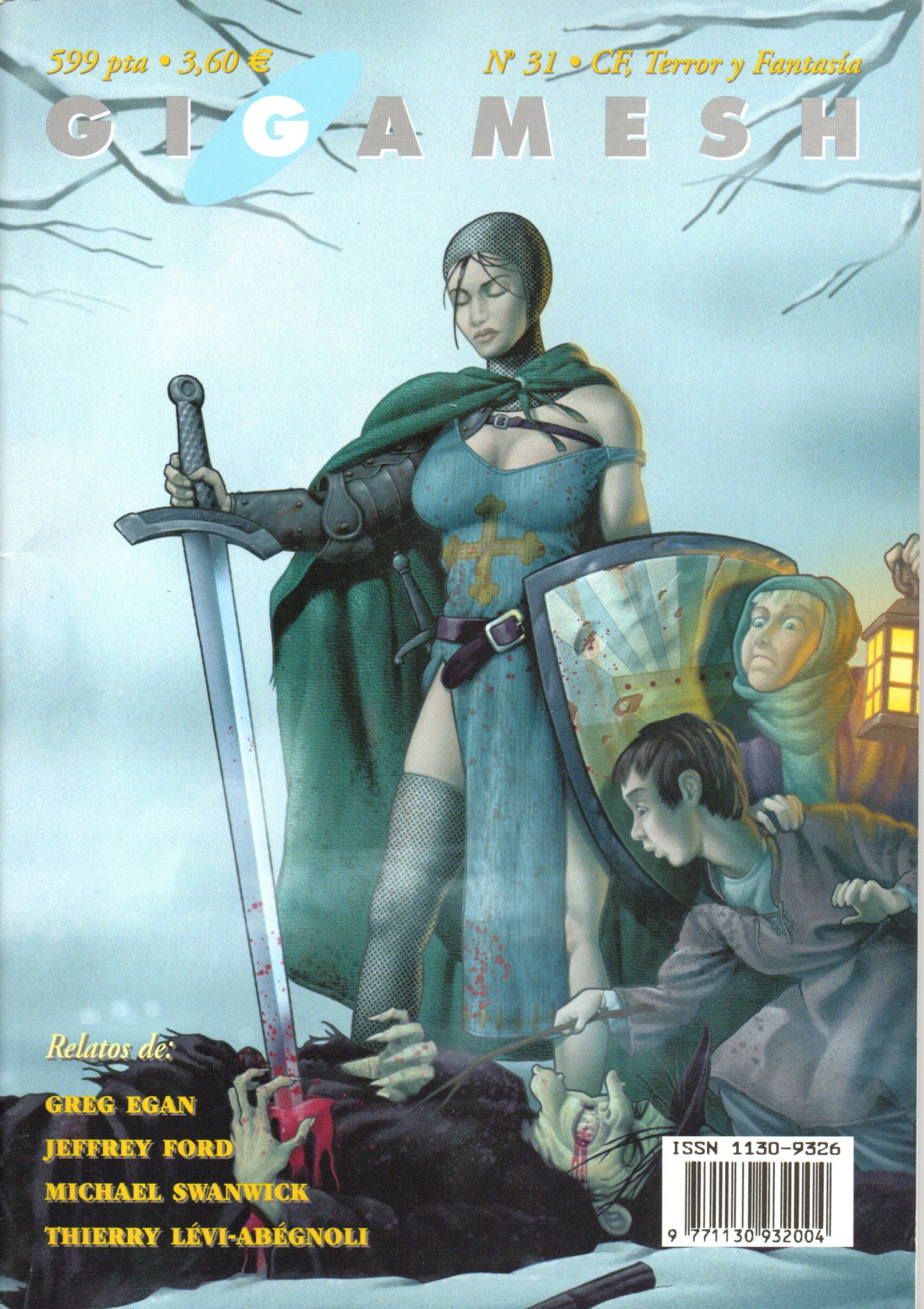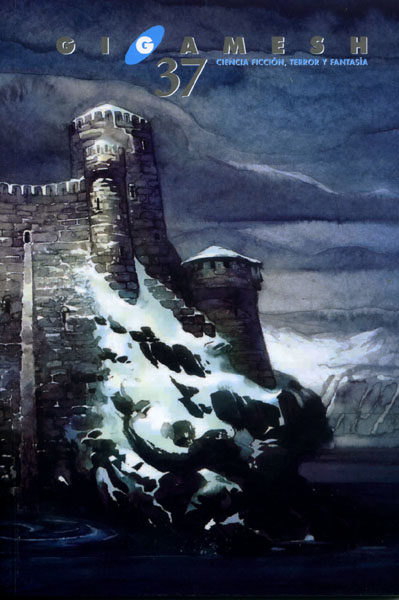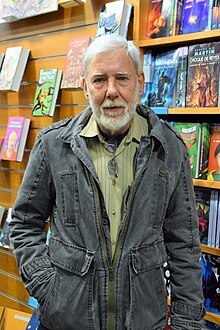


Books in series

Gigamesh 31
2002

Gigamesh 37
2004

Gigamesh 38
2004

Gigamesh 41
2005

Gigamesh 42
2005

Gigamesh 43
2006
Authors
Fernando Ángel Moreno (Madrid, 1971) ha dedicado su carrera investigadora al estudio del lenguaje literario y de la literatura de ciencia ficción, defendiendo siempre la fusión entre universidad y sociedad. Sus trabajos han aparecido en las principales revistas españolas del género y en diversas revistas científicas españolas y extranjeras. Es también uno de los fundadores de la premiada Hélice: Reflexiones críticas sobre ficción especulativa –máximo referente de la crítica de género en España– e impulsor de numerosos proyectos literarios. Se licenció y doctoró en Teoría de la Literatura por la UCM con Premio Extraordinario y Primer Premio Nacional Fin de Carrera. Ha sido profesor en la Universidad Alfonso X de Madrid e investigador en la Universidad de Tartu (Estonia). Actualmente es profesor de Teoría del Lenguaje Literario en la UCM.

Kelly Link is an American author best known for her short stories, which span a wide variety of genres - most notably magic realism, fantasy and horror. She is a graduate of Columbia University. Her stories have been collected in four books - Stranger Things Happen, Magic for Beginners, Pretty Monsters, and most recently, Get in Trouble. She has won several awards for her short stories, including the World Fantasy Award in 1999 for "The Specialist's Hat", and the Nebula Award both in 2001 and 2005 for "Louise's Ghost" and "Magic for Beginners". Link also works as an editor, and is the founder of independant publishing company, Small Beer Press, along with her husband, Gavin Grant.


Jeffrey Ford is an American writer in the Fantastic genre tradition, although his works have spanned genres including Fantasy, Science Fiction and Mystery. His work is characterized by a sweeping imaginative power, humor, literary allusion, and a fascination with tales told within tales. He is a graduate of the State University of New York at Binghamton, where he studied with the novelist John Gardner. He lives in southern New Jersey and teaches writing and literature at Brookdale Community College in Monmouth County. He has also taught at the summer Clarion Workshop for science fiction and fantasy writers in Michigan. He has contributed stories, essays and interviews to various magazines and e-magazines including MSS, Puerto Del Sol, Northwest Review, Hayden's Ferry Review, Argosy, Event Horizon, Infinity Plus, Black Gate and The Magazine of Fantasy & Science Fiction. He published his first story, "The Casket", in Gardner's literary magazine MSS in 1981 and his first full-length novel, Vanitas, in 1988.


Author of: close to 50 "strange stories" in the weird-tale and ghost-story traditions, two novels (The Late Breakfasters and The Model), two volumes of memoir (The Attempted Rescue and The River Runs Uphill), and two books on the canals of England (Know Your Waterways and The Story of Our Inland Waterways). Co-founder and longtime president of the Inland Waterways Association, an organization that in the middle of the 20th century restored a great part of England's deteriorating system of canals, now a major draw for recreation nationally and for tourism internationally. Grandson of author Richard Marsh.


Greg Egan specialises in hard science fiction stories with mathematical and quantum ontology themes, including the nature of consciousness. Other themes include genetics, simulated reality, posthumanism, mind transfer, sexuality, artificial intelligence, and the superiority of rational naturalism over religion. He is a Hugo Award winner (and has been shortlisted for the Hugos three other times), and has also won the John W Campbell Memorial Award for Best Novel. Some of his earlier short stories feature strong elements of supernatural horror, while due to his more popular science fiction he is known within the genre for his tendency to deal with complex and highly technical material (including inventive new physics and epistemology) in an unapologetically thorough manner. Egan is a famously reclusive author when it comes to public appearances, he doesn't attend science fiction conventions, doesn't sign books and there are no photos available of him on the web. Excerpted from Wikipedia.

Born in Allendale, New Jersey to Norwegian immigrant parents, Matheson was raised in Brooklyn and graduated from Brooklyn Technical High School in 1943. He then entered the military and spent World War II as an infantry soldier. In 1949 he earned his bachelor's degree in journalism from the University of Missouri and moved to California in 1951. He married in 1952 and has four children, three of whom (Chris, Richard Christian, and Ali Matheson) are writers of fiction and screenplays. His first short story, "Born of Man and Woman," appeared in the Magazine of Fantasy and Science Fiction in 1950. The tale of a monstrous child chained in its parents' cellar, it was told in the first person as the creature's diary (in poignantly non-idiomatic English) and immediately made Matheson famous. Between 1950 and 1971, Matheson produced dozens of stories, frequently blending elements of the science fiction, horror and fantasy genres. Several of his stories, like "Third from the Sun" (1950), "Deadline" (1959) and "Button, Button" (1970) are simple sketches with twist endings; others, like "Trespass" (1953), "Being" (1954) and "Mute" (1962) explore their characters' dilemmas over twenty or thirty pages. Some tales, such as "The Funeral" (1955) and "The Doll that Does Everything" (1954) incorporate zany satirical humour at the expense of genre clichés, and are written in an hysterically overblown prose very different from Matheson's usual pared-down style. Others, like "The Test" (1954) and "Steel" (1956), portray the moral and physical struggles of ordinary people, rather than the then nearly ubiquitous scientists and superheroes, in situations which are at once futuristic and everyday. Still others, such as "Mad House" (1953), "The Curious Child" (1954) and perhaps most famously, "Duel" (1971) are tales of paranoia, in which the everyday environment of the present day becomes inexplicably alien or threatening. He wrote a number of episodes for the American TV series The Twilight Zone, including "Steel," mentioned above and the famous "Nightmare at 20,000 Feet"; adapted the works of Edgar Allan Poe for Roger Corman and Dennis Wheatley's The Devil Rides Out for Hammer Films; and scripted Steven Spielberg's first feature, the TV movie Duel, from his own short story. He also contributed a number of scripts to the Warner Brothers western series "The Lawman" between 1958 and 1962. In 1973, Matheson earned an Edgar Award from the Mystery Writers of America for his teleplay for The Night Stalker, one of two TV movies written by Matheson that preceded the series Kolchak: The Night Stalker. Matheson also wrote the screenplay for Fanatic (US title: Die! Die! My Darling!) starring Talullah Bankhead and Stefanie Powers. Novels include The Shrinking Man (filmed as The Incredible Shrinking Man, again from Matheson's own screenplay), and a science fiction vampire novel, I Am Legend, which has been filmed three times under the titles The Omega Man and The Last Man on Earth and once under the original title. Other Matheson novels turned into notable films include What Dreams May Come, Stir of Echoes, Bid Time Return (as Somewhere in Time), and Hell House (as The Legend of Hell House) and the aforementioned Duel, the last three adapted and scripted by Matheson himself. Three of his short stories were filmed together as Trilogy of Terror, including "Prey" with its famous Zuni warrior doll. In 1960, Matheson published The Beardless Warriors, a nonfantastic, autobiographical novel about teenage American soldiers in World War II. He died at his home on June 23, 2013, at the age of 87 http://us.macmillan.com/author/richar...
Rodolfo Martínez (Candás, Asturias, 1965) es un escritor español de fantasía y ciencia ficción. Descubre la ciencia ficción y la fantasía siendo niño, probablemente a través de los cómics de superhéroes y, posteriormente, a través de su padre, lector habitual del género. Cursó estudios de filología inglesa, aunque no llegó a terminarlos y, desde 1995, trabaja como programador informático. Comenzó a publicar relatos en revistas y fanzines en la década de los noventa y en 1995 publica su primera novela, La sonrisa del gato. Rodolfo Martínez es una personalidad dentro del fandom en España, no sólo como autor, sino también por la labor que ha desarrollado dentro de diferentes asociaciones y publicaciones.

Evangelisti earned his degree in Political Science in 1976 with a historical-political thesis. He was born in Bologna, where he currently lives; he spends some time each year in Puerto Escondido, Oaxaca, Mexico, where he owns a house. Until 1990 his career was mainly academic. He also worked for the Italian Ministero delle Finanze (Treasury Department). His first written works were historical essays, including five books and some forty articles. In 1993 his novel Nicolas Eymerich, inquisitore won the Urania Award, which was established by Urania, Italy’s main science fiction magazine, with the aim of discovering new talent in the field. Urania published other novels of the series in the following years: Le catene di Eymerich ("Eymerich’s Chains", 1995), Il corpo e il sangue di Eymerich ("Eymerich’s Body and Blood", 1996), Il mistero dell'inquisitore Eymerich ("Eymerich’s Mystery", 1996), Cherudek (1997), Picatrix, la scala per l'inferno ("Picatrix, the Stairway to Hell", 1998), Il castello di Eymerich ("Eymerich’s Castle", 2001), Mater terribilis (2002). Most of the last ones were however first published as hardcover. Nicolas Eymerich is a real historical character, member of the order of the Dominicans and inquisitor in the Spanish Inquisition. He was born in 1320 in Girona, Catalonia, and died in 1399. Evangelisti’s interpretation of his character is a cruel, ruthless, haughty, restless man, who acts mercilessly to protect the Catholic Church against perceived menaces of natural or supernatural origin. At the same time he shows an outstanding intelligence and a deep culture in his actions. In the novels of the series he investigates the mysterious phenomena of Medieval Europe, thus subtly influencing many of the historical events of that epoch; on many occasions the solution of the riddles comes up from stories which are narrated along with the main plot, normally set in the present and in the future. Evangelisti's atmospheres are normally dark, nightmarish, haunting. Another success of 1999, also translated in several languages, is the Magus trilogy, a romanticized biography of the famous Middle Ages prophecies writer Nostradamus. The three novels, Il presagio ("The Omen"), L’inganno ("The Deceit") and L'abisso ("The Abyss") sold 100,000 copies in Italy. Evangelisti's novels are greatly appreciated in France (where he won several literary awards), Spain, Germany and Portugal. He is currently the director of the Carmilla magazine. In the last years he has written some works which show his love for heavy metal music, namely the short stories collection Metallo urlante (referring to the French magazine Metal Hurlant) and the novels Black Flag and Antracite: they are set during the American Civil War and feature a new character, Pantera, a palero shaman. One of his latest novels, Noi saremo tutto ("We Shall Be All"), spans several decades of the last century, exploring the life of Eddie Florio, a gangster, against the background of the history of the trade unions and the workers' battles for civil rights. Mexico is the setting for his next two novels, Il collare di fuoco ("The Fire Collar"), which was published in November 2005 and Il collare spezzato ("The Broken Collar", October 2006). In 2007 La luce di Orione was released, the ninth title in the Eymerich series, followed in 2010 by Rex tremendae maiestatis. Tortuga, a novel about pirates of the Caribbean, was published in 2008.

Pat Cadigan is an American-born science fiction author, who broke through as a major writer as part of the cyberpunk movement. Her early novels and stories all shared a common theme, exploring the relationship between the human mind and technology. Her first novel, Mindplayers, introduced what became a common theme to all her works. Her stories blurred the line between reality and perception by making the human mind a real and explorable place. Her second novel, Synners, expanded upon the same theme, and featured a future where direct access to the mind via technology was in fact possible. She has won a number of awards, including the prestigious Arthur C. Clarke Award twice,in 1992, and 1995 for her novels Synners and Fools. She currently lives in London, England with her family.

Paul Park (born 1954) is an American science fiction author and fantasy author. He lives in Berkshire County, Massachusetts, with his wife and two children. He also teaches a Reading and Writing Science Fiction course at Williams College. He has also taught several times at the Clarion West Writing Workshop. Park appeared on the American science fiction scene in 1987 and quickly established himself as a writer of polished, if often grim, literary science fiction. His first work was the Starbridge Chronicles trilogy, set on a world with generations-long seasons much like Brian Aldiss' Helliconia trilogy. His critically acclaimed novels have since dealt with colonialism on alien worlds (Coelestis), Biblical (Three Marys) and theosophical (The Gospel of Corax) legends, a parallel world where magic works (A Princess of Roumania and its sequels, The Tourmaline, The White Tyger and The Hidden World), and other topics. He has published short stories in Omni Magazine, Interzone and other magazines.


